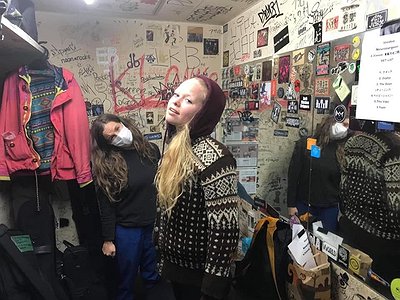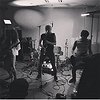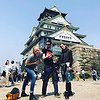Part 1
Name: Mette Rasmussen & MoE
MoE members: Guro Skumsnes Moe, Håvard Skaset
Interviewees: Mette Rasmussen, Guro Skumsnes Moe
Nationality: Danish (Mette Rasmussen), Norwegian (MoE)
Occupation: Saxophonist, Improviser (Mette Rasmussen), Bassist, Vocalist (Guro Skumsnes Moe), Guitarist (Håvard Skaset)
Current Release: Mette Rasmussen and MoE teamed up with Japanese drummer Ikuro Takahashi to record their collaborative album Painted. It's available from Relative Pitch Records.
Recommendations: Mette: Book: "Indigenous peoples and colonialism, global perspectives" by Colin Samson and Carlos Gigoux.
Guro: Jens Bjørneboe: "History of bestiality"
If you enjoyed this interview with Mette Rasmussen & MoE, find out more about them using the following links: Mette Rasmussen has a soundcloud account and a facebook page. MoE have an information page on conradsound. Or visit them on facebook.
When did you start playing your instrument, and what or who were your early passions or influences? What what is about music and/or sound that drew you to it?
Guro: I had music close to me all throughout my upbringing. My father was composing children's music and my mother through choir and piano. I think though I absorbed music through starting doing classical ballet at the age of 10, (which I continued to do until I was 21), as really something I surrendered to.
I taught myself how to play the guitar at the age of 11 and my dad bought me an electric bass at the age of 12, because there was a school concert that needed someone to play bass. I feel like music has always been there for me. I remember reading in my diary from 12 years old asking: "I wonder if everyone thinks music as important as I do?"
Mette: I grew up on a farm, pretty far out in Denmark and was surrounded by green fields and the smell of dark Danish soil. My head was always busy creating ideas and worlds of my own. When I was exposed to music, my head cracked open and my brain latched on.
In the beginning around 9, 10 years old, I would spend a lot of time recording tracks off the radio on cassettes, creating mixtapes. We had an old school 80s organ in the living room, which I would jam on when home from school. Later I would get a hometeacher, who drove a limousine and talked about cake-terminology, which was pretty cool back then as a kid.
For most artists, originality is first preceded by a phase of learning and, often, emulating others. What was this like for you? How would you describe your own development as an artist and the transition towards your own voice? What is the the relationship between copying, learning and your own creativity?
Guro: Exciting question! There has always been a strong drive within me towards being as close to the music as I can possibly get. I´ve taken some rough detours I think, because this has been such a burning force, and minimized my view towards other ways to make my life with music.
When I took my bachelor degree in Kristiansand, my luggage was jazz influences from buying CDs, and also from my sister and dad running the jazz club in the town where we lived,and listening to PRIMUS, Les Claypol, Frank Zappa, Morphine. The doors opened up towards free jazz, through students in my class and Henry Grimes, Peter Kowald and Joelle Leandre became my new inspirations. I was so stubborn and didn't see the use of what the bass teacher wanted to teach me and he slowly let go of trying and saw I was finding my own way, a way he didn't understand.
It was a mix between improvisation and composed songs, through the band Art Directors. Through master studies in Oslo, where this band was accepted into, I got to know Else Olsen Storesund and she opened up the door towards Open Form and the practice of the New York school from the 60s. That gave me another navigation point towards where I wanted to go myself. Meeting Joelle Leandre and Fred Frith were also essential meetings as to understanding the responsibility I had for the music I wanted to make. That's at least how it translated to me.
So when I look back it has been more the personal meetings, and learning about different schools and practises that I have translated into my own playing, more than copying. Or that is perhaps copying ... Finding out about noise music was also something that set out more navigation points for me. Meeting Harald Fetveit, both playing with him and through the concert series Dans for Voksne and through meeting Lasse Marhaug and the festival al Ears which I was a part of from 2008-2018.
Mette: I think I always got everything backwards. Mostly because I didn't get anything at all. I even think at the most enlightened moments of my life, I was quite lost.
I think finding my voice and developing it has happened primarily on tour, with the emphasis on playing in front of people, taking the music to a presence beyond the “now”. The emphasis on touring seems to be what has shaped me the most.
But I have had a lot of wonderful people along the way which have inspired me a great deal. Especially bandmates. The creator and The creation in music is not necessarily the same thing, it can originate from one person, but go through a lot of other people to form and end up as a creation. I also think we as people do that.
Guro: Yes, what opened up from starting touring has definitely made a strong impact on me as well.
What were some of your main artistic challenges when starting out as an artist and in which way have they changed over the years?
Guro : In a way my ability of wanting to be as close to the music as I possibly could, was a challenge. Only I had no way of seeing it because I was enclosed by the presence. I don´t know if I make myself understood by saying this. I think the time we have been through, inside Norway for more than a year, has opened up my views towards my earlier methods and made me see this. I think I could not have chosen any other way either, because of who I am and the surroundings I chose.
I still focus on the music as the only material I am communicating through, but I have learned there are many ways. I think when I stopped dancing, and just did music, my arms and back started to be more troublesome. But I do a lot of exercise and run every day, and I also dance, to make myself capable of playing as much as I want.
Mette: I moved to Trondheim, Norway at the end of a study that lasted 6 months. And basically I had no network there or family. I had very little money at that time and had a hard time finding a job at first to provide for rent. At one point I juggled like 4 different small time jobs besides playing music and touring abroad, mostly badly paid gigs at that time. At one point I sat down and decided that if I ever was gonna survive from playing music, I had to pursue the music I really wanted to do and trust in it. So I quit my other jobs and invested all my time in trying to book shows. Most of what I did at that time was through facebook and people I met, and there would always be a ton of middle links to get just one gig, and getting together an entire tour was hard work.
Tell me about your instrument, please. How would you describe the relationship with it? What are its most important qualities and how do they influence the musical results – and possibly even your own performance?
Guro: I started to play electric bass but wanted an acoustic bass, from all the music I listened to. It was an immediate perfect fit, also from having had dance as an important part of my life for so long. Somehow it was not only the instruments making the sounds but it came from movements. At different times I have felt it like I was not a bass player, that was just my medium and it created sounds. As a medium towards finding new sounds.
But I do love my basses. From electric to octobass. I love the depth. I have to tune my double bass down to C, the result of having an octobass. “Well - is this the deepest you can go …?”
Mette: I have carried around my instrument since I was a kid. Going somewhere without it feels awkward, like I forgot to put on my pants. It is about time it had an overhaul, it has a lot of wear and tear right now. The last time I took it apart was 10 years ago, and I had a guy show me how to replace pads, which I did on the entire body. But it needs a complete overhaul for its body work, 10 years is quite a long time without that.
I broke my mouthpiece some years back, which was a total nightmare. It was an old vintage handmade piece, that I played for a long time, and you can no longer get the same one anymore. I had to look around for a replacement, and actually that turned out to be healthy, to not get too religious about just one particular mouthpiece.
But at the time it happened, it was a nightmare.







